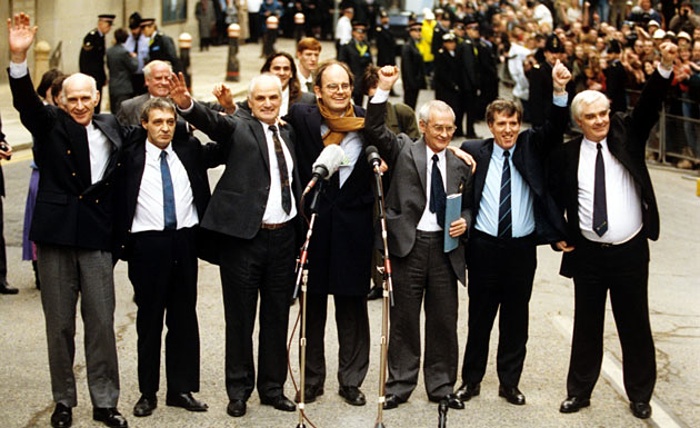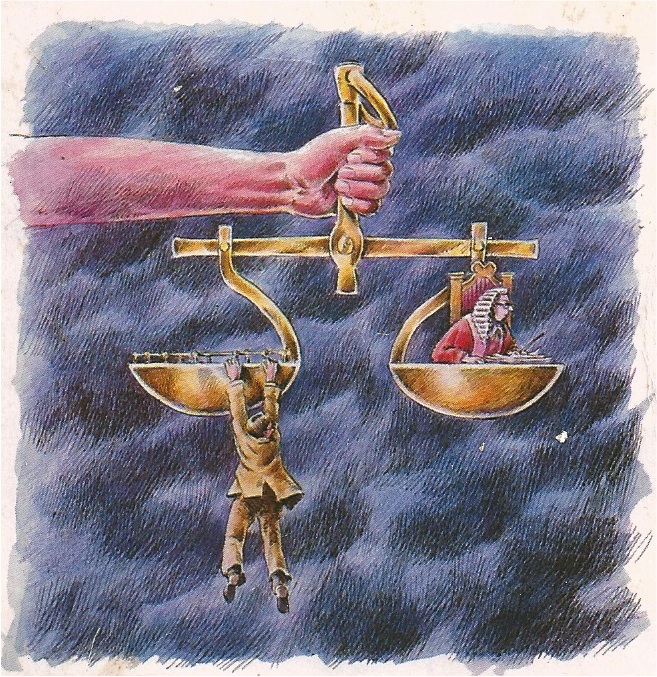[contextly_auto_sidebar]
 On a sunny afternoon on 14 March 1991, the Birmingham Six walked free from the Central Criminal Court after more than 16 years’ wrongful imprisonment. For six of those years, I chaired the London-based campaign for the men’s release and exoneration.
On a sunny afternoon on 14 March 1991, the Birmingham Six walked free from the Central Criminal Court after more than 16 years’ wrongful imprisonment. For six of those years, I chaired the London-based campaign for the men’s release and exoneration.
My memories of the day comprise a jumble of images: a huge ecstatic crowd lining the Old Bailey as the men called for the release of other innocent prisoners, the Six driven triumphantly away in spacious limousines paid for by the campaign while their families and friends followed in humbler community transport vehicles, a euphoric private party at a large Hampstead house owned by a Catholic religious order from where three of the men were taken by Granada TV to a Berkshire hotel while the other three attended an exhilarating celebration at Camden Irish Centre where the campaign had held many of its meetings.
The men’s exoneration marked the culmination of unprecedented combined efforts of a large number of individuals and organisations. These included the men and their families who remained steadfast throughout their long ordeal, Granada’s World in Action team who made five films about the case uncovering significant fresh evidence in the process, journalist and later MP Chris Mullin who investigated the case thoroughly as detailed in his book Error of Judgement, the men’s formidable legal team led by Gareth Peirce and Michael Mansfield, politicians such as the late Conservative MP Sir John Farr and a then obscure Labour backbencher called Jeremy Corbyn as well as thousands of ordinary men and women in Britain and elsewhere who campaigned vigorously for justice.
Three unwise judges
Our elation that day contrasted markedly with the atmosphere of gloom and mendacity which pervaded the Central Criminal Court on a bitterly cold day in January 1988 when Lane LCJ and his colleagues peremptorily dismissed the men’s appeal against conviction after a six week hearing.
On one occasion during the 1987 appeal, prosecutor Igor Judge QC (later Lord Chief Justice) paused from the arduous task of opposing compelling evidence supporting the men’s innocence to complain about the London campaign holding daily media briefings and encouraging prominent observers from around the world to attend the hearing. His clear insinuation was that we should be stopped. Efforts by the men’s supporters to shine a light on the proceedings were sufficiently effective that even the Times newspaper criticised the Court’s verdict under the headline ‘Three Unwise Judges’.
Widespread outrage over the Court’s irrational rejection led to the emergence of scores of campaign groups across Britain, Ireland, Europe and the USA ranging as far east as Helsinki to San Francisco in the west.
It’s sometimes overlooked that in detailing its reasons for quashing the Birmingham Six convictions, the Court of Appeal flatly denied any suggestion that the men were beaten while in police custody. On 27 March 1991, I sat with four of the men at the Royal Courts of Justice (RCJ) as Lloyd LJ delivered a judgement riddled with factual inaccuracy and logical inconsistencies.
Its primary purpose seemed to be the exoneration of the Court of Appeal itself (and two previous decisions to uphold the convictions) rather than to absolve the men of involvement in the 1974 Birmingham pub bombings. As Lloyd LJ began to reject the men’s account of their brutal mistreatment by West Midlands Police officers, the four men, their lawyers, family and supporters rose to their feet and walked silently from the court. Paddy Hill accurately and succinctly summarised the Court’s graceless and grudging judgement ‘What else would you expect from a pig other than a grunt?’
 The men’s release gave rise to important initiatives including the establishment of a Royal Commission into the criminal justice system. In 1993, the Commission recommended the creation of a new independent body to investigate – and where appropriate refer to the courts – claims of wrongful conviction. During the 1990s, a series of appeal cases laid down principles for the protection of those wrongly accused and convicted.
The men’s release gave rise to important initiatives including the establishment of a Royal Commission into the criminal justice system. In 1993, the Commission recommended the creation of a new independent body to investigate – and where appropriate refer to the courts – claims of wrongful conviction. During the 1990s, a series of appeal cases laid down principles for the protection of those wrongly accused and convicted.
In 1992, Judith Ward (whose support committee I chaired) was freed after more than 18 years’ wrongful imprisonment for the M62 coach bombing. In her case, the Court of Appeal set out detailed guidelines concerning police and prosecution disclosure of relevant case material (some of which the government swiftly annulled in the Criminal Procedure and Investigations Act 1996). I also chaired the campaign for the Bridgewater Four. That case introduced the important provision that if the Home Secretary (and subsequently the Criminal Cases Review Commission) was minded to refuse a referral application, provisional reasons for rejection must be issued to allow informed representations to be made.
Finally, in April 1997 some six years after the Six were released, the Criminal Cases Review Commission (CCRC) took up its duties. A few days later, I received a telephone message from the Commission’s Chief Executive. Would I like a chat about Danny McNamee wrongly convicted in connection with the 1982 Hyde Park bomb whose campaign I then chaired?
The case had been with the Home Office’s C3 Division for years with little apparent progress. Accustomed to C3’s secretiveness, lethargy and sullen antagonism, I was genuinely astonished. A few weeks after I spoke with the Chief Executive, I had an amiable conversation with the Commissioner appointed to examine Danny’s case, Baden Skitt. As an inspector with West Midlands Police he’d been the first uniformed senior officer on the scenes of the dreadful carnage caused by the Birmingham pub bombs. He lost no time in investigating Danny’s case and just two months after the CCRC was set up, the conviction was the new body’s first referral to the Court of Appeal leading to his 1998 exoneration.
Once the CCRC was up and running, many of us naively believed there was no longer a need to campaign against miscarriages of justice. Our initial optimism turned out to be misplaced.
The Court of Appeal soon reverted to its traditional obduracy towards those claiming innocence. This has caused the CCRC progressively to adopt an excessively timid approach to referral decisions while maintaining an increasingly ‘arms length’ relationship with applicants and their representatives. The Commission has, moreover, been seriously underfunded almost since its creation inhibiting its capacity to conduct comprehensive investigations in more complex cases.
The producer of the World in Action films about the Six used to remind me that by 1991 Granada spent £2m investigating and reporting on the evidence in the men’s case. That’s £3m at today’s values – more than half the CCRC’s entire annual budget. The question is sometimes posed whether the Commission would refer the Birmingham Six convictions if presented with the same evidence which persuaded the Home Secretary in 1990. The answer to such a question is ultimately unknowable but it’s highly unlikely the Commission (or any media organisation in today’s constrained financial environment) could afford to devote anything like the investigative resources which confirmed the men’s innocence.
Over the years, the CCRC has come to accept delay in reaching decisions almost as if it were an immutable law of nature. I represent in his CCRC application former nurse Colin Norris wrongly convicted in 2008 of murdering elderly hospital patients with insulin. Colin has now been waiting more than four years for the Commission to decide whether fresh evidence casting serious doubt on expert scientific testimony at his trial merits referral back to the Court of Appeal.
 In 2007, I sat glumly at Sam Hallam’s first appeal in the very same courtroom where 17 years earlier I’d attended preliminary hearings in the Birmingham Six case. In its zeal to uphold Sam’s conviction, the Court of Appeal engaged in logical contortions which even Lord Lane in his heyday might have hesitated to perform. Faced with the fact that the chief prosecution witness disowned at trial a statement inculpating Sam, the Court ruled that his words as recorded in the trial transcript must have been interpreted by the jury as meaning their exact opposite.
In 2007, I sat glumly at Sam Hallam’s first appeal in the very same courtroom where 17 years earlier I’d attended preliminary hearings in the Birmingham Six case. In its zeal to uphold Sam’s conviction, the Court of Appeal engaged in logical contortions which even Lord Lane in his heyday might have hesitated to perform. Faced with the fact that the chief prosecution witness disowned at trial a statement inculpating Sam, the Court ruled that his words as recorded in the trial transcript must have been interpreted by the jury as meaning their exact opposite.
We were back in Alice in Wonderland territory. Nor have some police officers heeded the requirement to disclose all relevant material. As Sam’s representative in his application to the CCRC, I received a copy of Thames Valley Police’s report on their lengthy investigation of the case.
I vividly recall my anger as a catalogue of non-disclosure by Metropolitan Police officers was revealed including the identity and whereabouts of a suspect also called Sam who’d been the subject of rumours concerning the murder of trainee chef Essayas Kassahun, seizure from another suspect of a makeshift weapon similar to one Sam Hallam was alleged to have wielded and crucially the existence of a mobile phone image which showed Sam had been in a pub more than a mile away from the scene shortly before the murder happened. No police officer faced any sanction for non-disclosure which caused an innocent young man to spend seven years in prison.
Draconian cuts to legal aid provision mean that many prisoners can’t find a lawyer to assist them. Sadly, I’m forced to conclude 25 years after the release of the Birmingham Six that it’s even harder in 2016 for innocent prisoners to achieve justice than it was in 1991.







